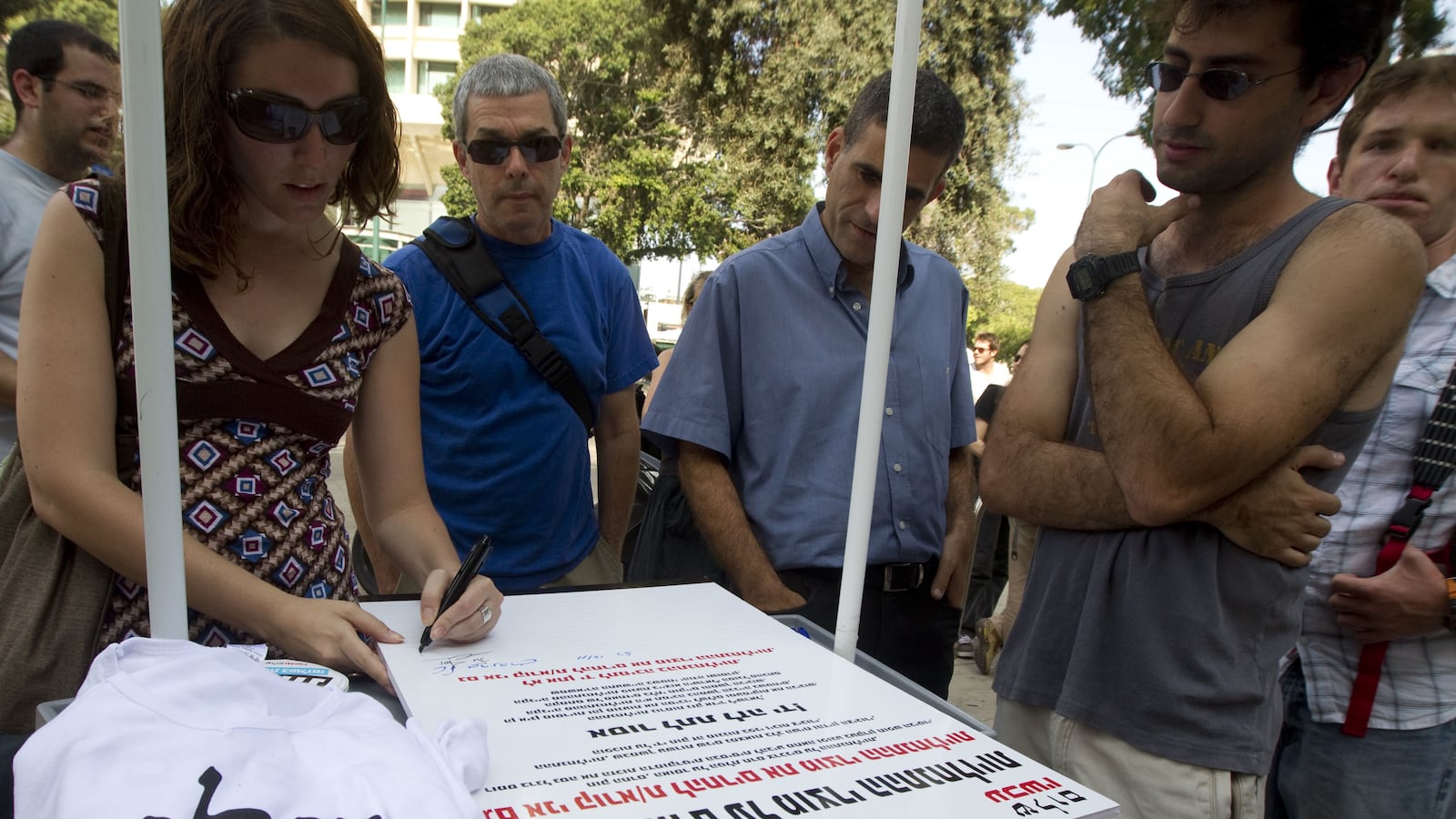Cheerleaders advocating a campaign of boycott, divestment and sanctions (BDS) against Israel have reacted with understandable dismay to the bombshell remarks dropped by Palestinian President Mahmoud Abbas at a press conference in South Africa during the memorial events for Nelson Mandela last week.
“No, we do not support the boycott of Israel,” Abbas told reporters. “But we ask everyone to boycott the products of the settlements. Because the settlements are in our territories. It is illegal…But we don’t ask anyone to boycott Israel itself. We have relations with Israel. We have mutual recognition of Israel.”

It wasn’t quite a denunciation of the BDS campaign, but the remarks threatened to transform the boycott from its self-image as the principled projection of native Palestinian policy to the bastard foreign child of freelance troublemakers.
BDS supporters swung into action, unleashing a torrent of invective from the likes of Ali Abunimah, who excoriated Abbas in his Electronic Intifada blog, ridiculing the Palestinian president and PLO leader as the “de facto leader of the Ramallah-based Palestinian Authority” and accusing him of “undermining” the Palestinian struggle.
Abbas’s comments came days before the BDS movement celebrated its latest victory—a vote by members of the American Studies Association to endorse a boycott. The move follows a similar pro-boycott policy adopted recently by the Association for Asian American Studies and repeated anti-Israel resolutions adopted by the University and College Union in Britain.
The BDS campaign is also gathering steam beyond the world of academia.
The publication of new EU guidelines this year that limit funding by EU institutions to Israeli partners within the Green Line triggered a spasm of concern in Jerusalem that Israel might be subject to a trade boycott and even excluded from lucrative funding opportunities provided by the Horizon 2020 research program. But a mechanism was devised to avoid excluding Israel from Horizon 2020 and just last week Israel was admitted as the first non-European member of CERN, the nuclear research program, cementing Israel’s position as a key member of the European research pantheon.
Despite the BDS pressures, Israel’s trade has been unaffected so far, with exports to the European Union soaring to record levels. But tiny BDS cracks have begun to appear in the relationship with Europe, Israel’s largest trading partner. Most recently, the Dutch water giant Vitens ceased co-operation with Israel’s Mekorot water company, and European countries including Britain—with whom trade has also soared—have issued guidelines warning companies that activity in West Bank settlements could involve “legal and economic risks stemming from the fact that the Israeli settlements, according to international law, are built on occupied land and are not recognized as a legitimate part of Israel’s territory.”
One of the motivating factors behind John Kerry’s current push for a peace agreement between Israel and the Palestinians is the belief of U.S. and European officials sympathetic to Israel that the BDS campaign is beginning to make inroads that will, left unchallenged, begin to nibble away at mainstream support for Israel in the democratic world.
From Abbas’s point of view, this surely should be good news and strengthen his hand in the current peace talks, helping to speed up their glacial progress. That is what makes the timing of his comments about the boycott so extraordinary and the vituperative response of BDS supporters so understandable.
Israelis hate the boycott for many reasons. It reminds Jews of the Nazi boycott of Jewish businesses in the 1930s and so carries echoes of vicious anti-Jewish sentiment. Israelis feel it unfairly singles them out for special treatment when there are other occupiers and other human rights abusers who not only escape international criticism, but actually sit in judgment on Israel at various international forums, chief among them the U.N. Human Rights Council. And by embracing, uniquely, the tactic identified so closely with the struggle against white South Africa, BDS paints Israel as the new Apartheid practitioner and international pariah state—an association that Israel and its supporters reject as unfounded and unfair.
However, the BDS campaign prides itself on adopting the boycott tactic not from any special animus towards Israel—certainly not towards Jews, since many BDS supporters are themselves Jewish—but as a legitimate response to a call from Palestinians themselves.
The BDS movement draws its legitimacy—and the answer to these criticisms—from a declaration issued in July 2005, signed by more than 100 Palestinian trade unions and organizations, calling on “people of conscience all over the world to impose broad boycotts and implement divestment initiatives against Israel similar to those applied to South Africa in the apartheid era.”
To opponents of the boycott, Abbas’s comments will underscore their notion that the BDS campaign, far from being a homegrown Palestinian movement, was an idea born abroad and then transplanted into Palestinian civil society. Indeed, the groups that signed the 2005 boycott call contain some unlikely political actors—including the East Jerusalem YMCA, the Ma’an TV Network in Bethlehem, and the Child Development and Entertainment Center in Tulkarem.
But it is more likely to be Abbas, not the BDS movement, who is out of tune with Palestinian popular opinion. Al-Monitor commentator Daoud Kuttab believes Abbas’s statement “reflects the absence of any clear strategy from the Palestinian political leadership except for negotiations.”
But the real answer may be more complex. The Palestinian economy is intertwined with Israel, which controls all supply routes to the West Bank and most to Gaza, and is the Palestinians’ largest trading partner by default. The Palestinians are also committed to a series of economic arrangements with Israel under the 1994 Paris Protocol to the Oslo Peace Accords.
“Abbas is the head of the Palestinian Authority who is the partner in negotiations with Israel. They cannot call for a boycott of Israel as the same time as they are engaged in negotiations with Israel,” said Samir Awad, professor of international relations at Birzeit University. “But the people are free to call for a total boycott of Israel and I think that’s what we’re doing.”
“If we are to draw on the example of South Africa, the only way the apartheid regime there was forced to negotiate with the ANC and then to dissolve itself and allow one man one vote—that was achieved through the boycott of the apartheid regime,” Awad said. “I believe we have an apartheid regime here—not inside Israel but in the West Bank and Gaza, and I think it should be subject to a boycott, totally.”






